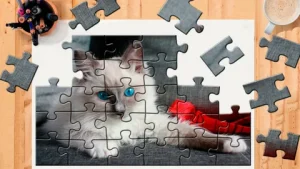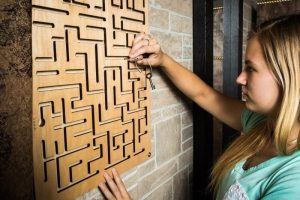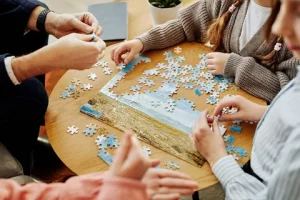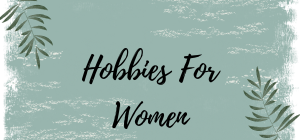Relaxation, Fun, and Mental Stimulation
In today’s fast-paced world, it’s easy to feel overwhelmed by daily responsibilities. For women who juggle work, family, and personal commitments, having a hobby is a must for maintaining balance and mental well-being. Puzzle-solving is a fantastic choice that combines fun, relaxation, and cognitive benefits. Whether you prefer solo challenges or group activities, therefore, there’s a Puzzle-Solving hobby perfect for you.
Why Puzzle-Solving Offers the Ideal Hobby for Women
Puzzle-Solving isn’t just an enjoyable pastime—it’s a way to nurture creativity, improve focus, and even build stronger relationships. It offers a mental workout that can enhance problem-solving skills and keep the mind sharp. Plus, it’s versatile enough to fit into any lifestyle, whether you have five minutes or an entire afternoon to spare.
 Types of Puzzle-Solving Hobbies
Types of Puzzle-Solving Hobbies
1. Jigsaw Puzzles:
A Meditative Escape
Jigsaw puzzles are timeless classics that provide a sense of calm and achievement. They allow you to focus on creating something beautiful, piece by piece.
Why Women Love Them:
They combine creativity with a structured challenge. Themes like nature, travel, or famous artworks are particularly popular.
Getting Started:
Start with smaller puzzles, like 500 pieces, and gradually move on to more complex designs.
2. Crossword Puzzles:
Wordsmiths Rejoice
Crossword puzzles are ideal for women who love language and trivia. They test your vocabulary and general knowledge while providing a satisfying mental challenge.
Where to Find Them:
You can solve crosswords in newspapers, specialized puzzle books, or apps like The New York Times Crossword.
Benefits:
Enhances word skills, boosts memory, and keeps your mind sharp.
3. Sudoku:
For the Logically Minded
It’s simple to understand but challenging to master, with difficulty levels ranging from beginner to expert.
Pro Tip: Start with easier grids if you’re new and progress to harder puzzles as your skills improve.
 4. Escape Room Puzzles:
4. Escape Room Puzzles:
Social Problem-Solving
If you enjoy group activities, escape rooms are a fantastic way to combine puzzles with storytelling. They challenge your teamwork and critical thinking skills as you work together to solve clues and “escape” within a set time.
Why They’re Great: Perfect for bonding with friends or family.
Virtual Options: Online escape rooms allow you to enjoy this activity from home.
5. Logic Puzzles:
Mind-Bending Fun
Logic puzzles, such as riddles or brainteasers, are excellent for quick mental stimulation. These puzzles come in various formats, from books to mobile apps, making them accessible anytime.
Best For: Women who love challenges that test their wit and creativity.
The Benefits of Puzzle-Solving for Women
1. Cognitive Benefits
Puzzles keep your brain active and engaged. They enhance memory, improve focus, and develop problem-solving skills. Studies have shown that regular puzzle-solving can even delay cognitive decline.
2. Emotional Well-Being
Puzzles provide a sense of calm and relaxation. The focused attention they require can help reduce stress and anxiety, offering a welcome break from life’s pressures.
3. Social Connections
Puzzle-solving doesn’t have to be a solitary activity. Whether you’re working on a jigsaw puzzle with your family or collaborating in an escape room with friends, puzzles encourage teamwork and help strengthen relationships.
4. A Sense of Accomplishment
The satisfaction of solving a challenging puzzle can boost your self-esteem. It’s a small but meaningful way to celebrate personal achievements.
 How to Incorporate Puzzle-Solving Into Your Life
How to Incorporate Puzzle-Solving Into Your Life
1. Choose a Puzzle That Matches Your Interests
Think about what excites you. If you love visuals, try jigsaw puzzles. If words are your passion, crosswords are a perfect fit. For logic lovers, Sudoku or brainteasers are great options.
2. Start Small
Don’t overwhelm yourself with overly complex puzzles at first. Begin with something simple and gradually increase the difficulty as you build confidence.
3. Make It a Routine
Dedicate a specific time each day or week for your puzzle-solving hobby. Even 10–15 minutes can make a big difference in your mood and mental clarity.
4. Share the Fun
Invite family or friends to join you. Group puzzle-solving sessions are a wonderful way to connect and bond.
5. Take Advantage of Technology
Many apps and websites offer puzzles in various formats, making it easier than ever to enjoy this hobby anywhere.
Puzzle-Solving Across Different Stages of Life
One of the best things about puzzles is their adaptability.
- In Your 20s and 30s
Puzzle-Solving: A Lifelong Hobby
Puzzle-solving isn’t just a fleeting interest—it’s a hobby that grows with you. As your skills improve, you can explore more challenging puzzles or branch out into new types. The key is to keep it enjoyable and rewarding.
Conclusion
Puzzle-solving hobbies for women combine relaxation, mental stimulation, and personal satisfaction in an enjoyable way. As you piece together a serene jigsaw, tackle a challenging crossword, or crack codes in an escape room, puzzles go beyond simple entertainment—they become tools for self-improvement and meaningful connection. Start your puzzle journey today and embrace the adventure!
 Hobbies for Women My WordPress Blog
Hobbies for Women My WordPress Blog